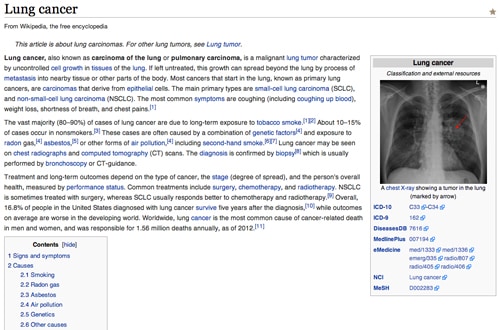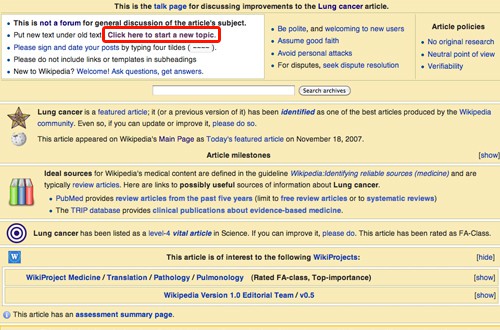
Wikipedia – the free online encyclopedia of pretty much everything – launched to little fanfare in 2001.
In a talk for idea-sharing organisation TED (see below), Wikipedia founder Jimmy Wales recalled in the early days looking at a list of the most popular websites on the internet and thinking his project could possibly make the top 100 or top 50. Things have changed since and Wikipedia is now the sixth most popular website in the world according to web information firm Alexa; beaten only by Facebook, Google, YouTube, Yahoo and Chinese-language search engine Baidu.com.
With such popularity it’s no surprise that Wikipedia is a prominent source of health information. According to a recent IMS Institute report, Engaging Patients through Social Media the top one hundred Wikipedia pages for healthcare topics, on average, were accessed 1.9 million times in 2013, ranging from 4.2 million for tuberculosis, to 1.3 million for acne vulgaris. Moreover, observed the IMS report, Wikipedia is used throughout the entire patient journey, and not just at the point of treatment initiation or change in therapy.
Wikipedia’s influence has led to concerns about the reliability of its health information. A paper published recently in the Journal for the American Osteopathic Society said most Wikipedia articles representing the 10 most costly medical conditions in the US contain many errors when checked against standard peer-reviewed sources. The authors stress caution should be used when using Wikipedia to answer questions regarding patient care.
Through WikiProject Medicine, a partnership with the Cochrane Collaboration, Wikipedia is working to improve the correctness and usability of its medical information. In January, Cancer Research UK said it plans to recruit its very own ‘Wikipedian in Residence’ to help ensure Wikipedia has the most up to date and accurate information on cancer. Funded by the Wellcome Trust and supported by Wikimedia UK, the new in-house Wikipedian role will be the first of its kind to be created by a medical research organization.

The Wikipedia page for lung cancer
Yet, pharma remains fairly disengaged, reports IMS. Perhaps indicating a potential model for pharma, in his June 13, 2012, open letter to pharmaceutical companies, Bertalan Meskó, MD, founder and managing director of Webicina.com, urged them to appoint employees as Wikipedia “spokespeople” who would perform all Wikipedia article edits on behalf of the company.
In comments submitted to the US Food and Drug Administration (FDA), in 2010, the US pharmaceutical trade group PhRMA suggested that manufacturers would welcome correcting misinformation about their products posted to sites like Wikipedia if these corrections were not subject to FDA regulation. In June 2014, the FDA offered draft guidance for companies seeking to correct misinformation posted by independent third parties and in chat rooms. A company may either correct legitimate misinformation directly on the forum or it may submit the correction to an individual blogger or author of a web page.
Editing a Wikipedia page
With this in mind, what should someone consider if asked to edit a healthcare-related Wikipedia page? Consider the following.
1. Monitor Wikipedia pages
To start, monitor the pages relevant to your company, your products and to the diseases you treat. Wikipedia pages are continually updated. Some disease pages, such as breast cancer, can undergo 75 major edits in just five months, says IMS. By monitoring, you will understand how the page editors manage updates, and where there are potential opportunities to contribute content meaningfully.
2. Set parameters for engagement
As part of your social media policy and governance, define and agree the parameters your company will follow to engage Wikipedia. For example, you may seek only to address inaccurate information that risks misleading readers about an approved product label. Or, more expansively, you might volunteer information you consider missing about the proven symptoms or science of a disease.
3. Work through the talk page, and avoid editing the page directly
Wikipedia frowns upon any perceived conflict of interest. The safest approach is to recommend an edit, additional text, or a new section, by using the ‘talk’ page. Identify yourself openly and explain the content you are inviting the page editors to consider. Transparency and remaining truly unbiased in the wording of your submission will be of the utmost importance. And you will need to cite your sources.
4. Stick to the facts and don’t be promotional
The pharma blog PharmaGossip reported a little while back how a representative of a pharma company anonymously made a change to a page that involved “a shift in emphasis” from the drug being “approved” to “indicated,” which the editors considered unacceptable. The article reads: “I’m not arguing about the accuracy of the information. What concerns me is the fact that a representative of a company who has a financial interest in the drug in question has anonymously shifted the emphasis of the article, which seems completely inappropriate to me.”
5. Recommend edits and don’t seek to rewrite entries
Taking the extra step of providing a rewrite vs concisely correcting specific inaccuracies or by sharing a link to the PI as a potential new reference may be perceived as influencing content.
6. Use judgement
Regulatory guidance remains to be clarified; this means there remains an element of uncertainty. For example, if your content is accepted to the page, it is possible that the FDA could hold the company responsible for the page in future.
If you decide to submit edits to Wikipedia, here’s a suggested outline and instruction: First, you will need to sign up for a Wikipedia account. We recommend using your name. It is possible to contribute without a name, however Wikipedia will have your IP address and can track it back to your company. And typically anonymity will not serve you well. Next, go to the page and to the edit > talk page tab. Here’s how you can structure your comment:
- Title (eg “recommended content updates to section….”)
- Introduction with disclosure (eg, “Hello… My name is John Smith from Pharma Company’)
- Explanation (eg, “I noticed some information about Medicine X is outdated and inaccurate and I wanted to address them in the appropriate manner…”)
- Quote the current, incomplete or inaccurate text (eg “We believe the following text to be out of date and potentially inaccurate…”]
- Provide suggested, accurate text (eg “We would invite you to consider the following new text…”)
- Cite your credible source(s) (“Here are the sources for our suggestion…”]
- Closing (eg, “Let me know if there are any questions. I’ll continue to watch this space…”)
- End the note with ; then hit save and tick the ‘watch this page’ box
If you are proposing a new section, then you’ll need to use the ‘new section’ talk page.

Use the ‘talk’ tool to suggest edits to an article on Wikipedia
Next steps
The Wikipedia tutorial is a great place to learn how to edit and to use the talk page. You can in fact practice commenting using the talk tab. This is a particularly helpful and safe way to learn how to write in Wiki. And for more reading, the UK’s Chartered Institute of Public Relations has a useful guide.




